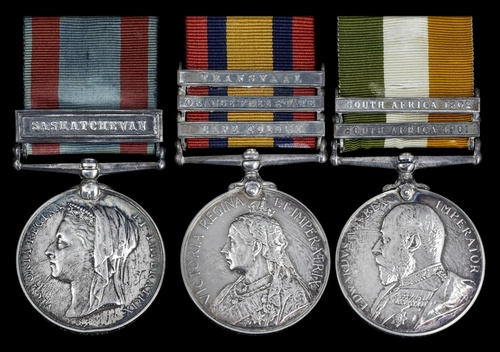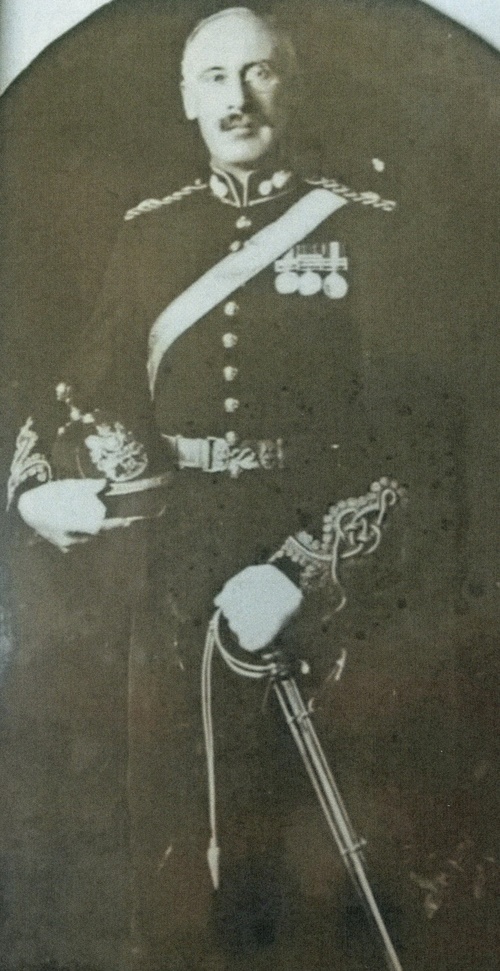Auction: 19001 - Orders, Decorations and Medals
Lot: 504
An unusual Campaign group of three awarded to Lieutenant-Colonel H. B. Strange, Royal Artillery, who served as A.D.C. to his father, Major-General T. B. Strange, during the 1885 rebellion, and later served on the Staff during the Boer War; with a keen eye to the future, he made an important contribution to the provision of munitions during the Great War
North West Canada 1885, 1 clasp, Saskatchewan (Lieut. Strange. R.A. Staff. A.F.F.), engraved naming; Queen's South Africa 1899-1902, 3 clasps, Cape Colony, Orange Free State, Transvaal (Capt: H. B. Strange. R.A.); King's South Africa 1901-02, 2 clasps, South Africa 1901, South Africa 1902 (Maj. H.B. Strange, R.G.A.), minor edge bruise to first, good very fine (3)
Harry Bland Strange was born on 16 September 1864 at Killarney, Ireland, the eldest son of Major-General Thomas Bland Strange. He graduated from the Royal Military College and spent two years surveying in Canada, later serving as A.D.C. to his father during the Riel Rebellion and seeing action on 28 May at Frenchman's butte. In 1885, Strange was offered a Commission in the Royal Artillery, and in the late 1880's was seconded to the Royal Ordnance Corps where he passed the Firemaster's course.
During the South African War he served mainly with the transport and from November 1900 until the end of hostilities, was D.A.A.G. for Transport and Lines of Communication; mentioned in despatches by General Kitchener (London Gazette 29 July 1902, refers), he was awarded a Brevet Majority, and was promoted Major in 1904.
On retirement in 1907, Strange joined Firth & Sons as Manager of Gun Works, and soon became a Director. He patented a number of his own inventions, including the cap for armour piercing shells, subsequently adopted universally by navies throughout the world. In the early months of the Great War, he used his considerable influence to ensure that the field artillery would be well supplied with shells - he foresaw the potential stalemale in trenches from the Swiss frontier to the sea - and agitated unceasingly and effectually for national supply and the creation of the Ministry of Munitions.
Appointed Director of A.M.4., he began the enormous task of providing factories and organising the manufacture of shells, cartridges, primers, and detonators, and then arranging their storage. Such was the insatiable demand for ordnance, that in total he was responsible for the creation of 18 factories and employment of 80,000 workers. However, due to overwork, his health deteriorated, and he retained permission to revert to Firth & Sons once again.
His services during the Great War never received public recognition, largely because he declined all remuneration and honours from the Government, convinced that at such times the country has the unreserved right to the services of its people at home, as in the field. According to family record, following his service in South Africa he was offered the choice of a D.S.O. or Brevet Majority - he accepted the latter.
Strange married Margaret McDowell in April 1890, who herself was reputedly wounded during the Great War. He died on 17 October 1935, having enjoyed his final years sailing regularly at the Royal Lymington Yacht Club, Hampshire.
Subject to 20% VAT on Buyer’s Premium. For more information please view Terms and Conditions for Buyers.
Sold for
£5,000







